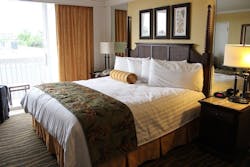What can hotels learn from Airbnb?
Since entering the hospitality scene in 2008, Airbnb has evolved from a trendy upstart to a full-on disruptor. The online marketplace now enables people to list, discover, and book accommodations in nearly 200 countries around the world.
This new kid on the hospitality block is actually an extension of a long-standing tradition of lodging alternatives that range from renting villas in Italy to choosing timeshare properties in Florida.
“Airbnb is taking what has always been out there, localizing it, and bringing properties together in a way that provides a streamlined alternative for travelers,” says Nunzio DeSantis, FAIA, LEED AP, Director of the HKS Hospitality Group in Dallas.
Though Airbnb’s home-sharing units represent less than 3% of revenue in the overall hotel industry, the online marketplace continues to grow exponentially each year. And the hospitality industry can’t help but take notice.
“As in any industry, choice often compels people to make changes and to stop taking things for granted,” says Keith Simmel, AIA, LEED AP, Principal of the Hospitality Studio at Cooper Carry in Atlanta. “If Airbnb helps hotel brands to up their game and make decisions that help people land at their properties, then it’s ultimately good for the overall industry.”
No doubt, Airbnb—and the numerous variations it has spawned—is well positioned to attract future generations of business and leisure travelers.
“People are willing to embrace the messiness of an Airbnb because they’re getting a more flexible, locally relevant experience,” says Caleb Mulvena, Principal at Mapos in New York. “If the larger hotel players can tap into that sense of messiness and adventure, but layer on a level of service that you don’t necessarily get with Airbnb, that will be something that’s really powerful.”
